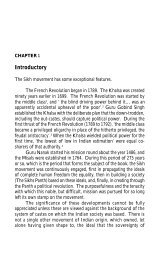Fundamentalism and the Sikh Religious Tradition by T.N. Madan
Fundamentalism and the Sikh Religious Tradition by T.N. Madan
Fundamentalism and the Sikh Religious Tradition by T.N. Madan
You also want an ePaper? Increase the reach of your titles
YUMPU automatically turns print PDFs into web optimized ePapers that Google loves.
ecommended in <strong>the</strong> Upanishads, although out of expediency, as did <strong>the</strong> Mahatma, <strong>the</strong><br />
religious prohibitions <strong>and</strong> pacificism are often violated. Infact, <strong>by</strong> <strong>Madan</strong>'s definition,<br />
Mahatma G<strong>and</strong>hi would be one of <strong>the</strong> first to be called a Fundamentalist.<br />
Here a deep <strong>and</strong> meaningful contrast between <strong>Sikh</strong>ism <strong>and</strong> Hinduism, need be<br />
recorded. Despite <strong>the</strong> efforts of numerous reformers <strong>and</strong> a century of Western impact, no<br />
one has been able to secure <strong>the</strong> unrestricted entry of even a Prime Minister or Deputy<br />
Prime Minister of India in <strong>the</strong> Hindu temples. Entry of Sudras in <strong>the</strong>m is indeed<br />
unthinkable because of <strong>the</strong> Scriptures, Shastras <strong>and</strong> "divine ordinances." in contrast it is<br />
well known that <strong>the</strong> objection of a Hinduised Mahant of a <strong>Sikh</strong> Gurdwara to <strong>the</strong> entry of<br />
a few <strong>Sikh</strong>s whom <strong>the</strong>y considered low caste, became <strong>the</strong> root cause of <strong>the</strong> entire class of<br />
Mahants being removed forcibly <strong>by</strong> <strong>the</strong> <strong>Sikh</strong>s from every <strong>Sikh</strong> Gurdwara in <strong>the</strong> country,<br />
because such a prohibition is grossly violative of <strong>the</strong> hymns in <strong>the</strong> Guru Granth. This<br />
ethical contrast is extremely revealing of <strong>the</strong> core of <strong>the</strong> two systems. It is not merely an<br />
ideological or scriptural contrast between <strong>the</strong> fundamentals of <strong>the</strong> two religious. It is a<br />
cultural contrast in <strong>the</strong> ethos, <strong>the</strong> motivations, <strong>the</strong> conditioning <strong>and</strong> deep religious<br />
responses, which <strong>the</strong> Gurus, <strong>the</strong> <strong>Sikh</strong> martyrs <strong>and</strong> <strong>Sikh</strong> history have created in <strong>the</strong> psyche<br />
of even an ordinary <strong>Sikh</strong>. The ban against entry imposed <strong>by</strong> <strong>the</strong> Mahant of <strong>the</strong> Gurdwara,<br />
was found so outrageous, that it provoked <strong>the</strong> moral indignation of <strong>the</strong> entire community,<br />
since it violated <strong>the</strong> very basis of <strong>the</strong> Guru Granth. In <strong>the</strong> case of Hindus, <strong>the</strong> bar against<br />
temple entry evokes hardly any response, much less indignation, even among <strong>the</strong> most<br />
religious, because it is in consonance with <strong>the</strong> spiritual injunctions or divine ordinance.<br />
Any yet, Hindu scholars like <strong>Madan</strong>, are fond of paying that <strong>Sikh</strong>ism is a Hindu sect. The<br />
scriptural, <strong>the</strong> ideological, <strong>the</strong> ethical <strong>and</strong> <strong>the</strong> historical contrasts are too glaring to be<br />
glossed over even <strong>by</strong> a casual student of <strong>the</strong> two systems.<br />
Indian Secularism has, thus, been only a device, which was considered necessary<br />
in a multi-religious society. But, since its administration has to be done <strong>by</strong> <strong>the</strong> majority,<br />
in reality, as has become evident, it has meant virtually both orthodoxy <strong>and</strong> orthopraxy,<br />
involving a serious gap between its profession <strong>and</strong> practice. In this background of<br />
Hinduism, <strong>Madan</strong>'s use of <strong>the</strong> word, <strong>Fundamentalism</strong>, for <strong>the</strong> whole-life <strong>Sikh</strong> worldview,<br />
reminds us of <strong>the</strong> comments of James Lewis on <strong>the</strong> Christian criticism of <strong>the</strong> socalled<br />
early pacificism of Guru Nanak <strong>and</strong> <strong>the</strong> later militancy of Guru Gobind Singh,<br />
"Given <strong>the</strong> popularity of this state of affairs, it would not be inappropriate to postulate<br />
some kind of unconcious repression-projection mechanism at work that might explain <strong>the</strong><br />
scholar's lack of even-h<strong>and</strong>edness. One does not have to be a psychoanalyst to perceive<br />
that <strong>the</strong> guilt about <strong>the</strong> gap between one's ideals <strong>and</strong> one's behaviour can be pushed out of<br />
<strong>the</strong> light of full awareness only to re-emerge as a projection. In lieu of a better<br />
explanation of <strong>the</strong> one-sided treatment of <strong>the</strong> <strong>Sikh</strong> religion <strong>by</strong> Westerners it appears to <strong>the</strong><br />
present writer that <strong>the</strong> relevant scholars are uncomfortable with <strong>the</strong> contradictions<br />
between <strong>the</strong> <strong>the</strong>ory <strong>and</strong> practice of <strong>the</strong>ir own religious traditions, have repressed <strong>the</strong><br />
problem <strong>and</strong> have projected <strong>the</strong> contradiction on to <strong>Sikh</strong>ism, a tradition that apparently<br />
(but not actually) contains <strong>the</strong> same contradiction. Thus <strong>the</strong>ir condemnation of <strong>Sikh</strong><br />
militancy is really a projection of <strong>the</strong>ir own (unexpressed, repressed) condemnation of <strong>the</strong><br />
Christian tradition. The point here is not lo criticise Christianity, but ra<strong>the</strong>r to once again<br />
point out <strong>the</strong> differential treatment that <strong>the</strong> <strong>Sikh</strong> religion has received at <strong>the</strong> h<strong>and</strong>s of<br />
Western scholars. These kinds of evaluative statements would have been less
















